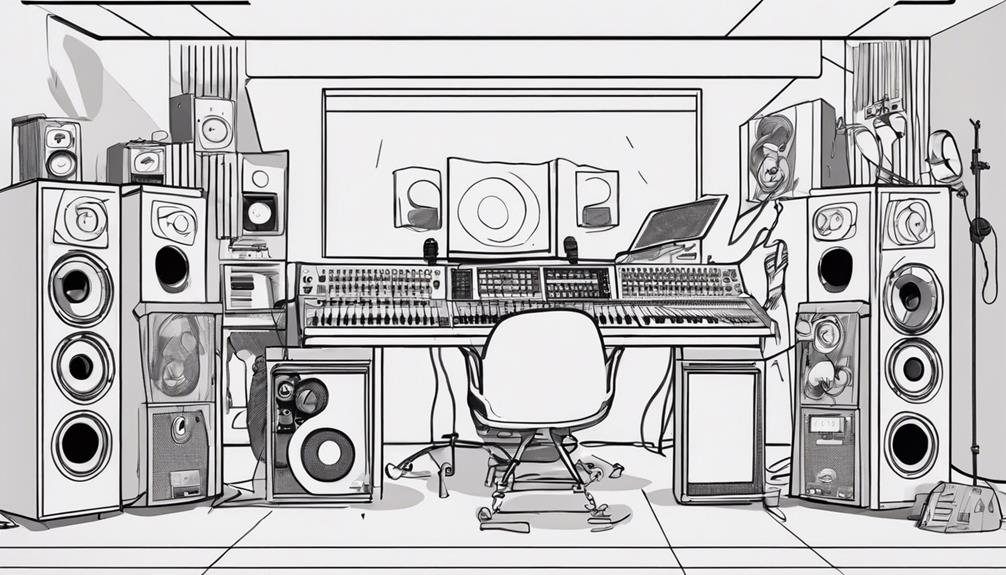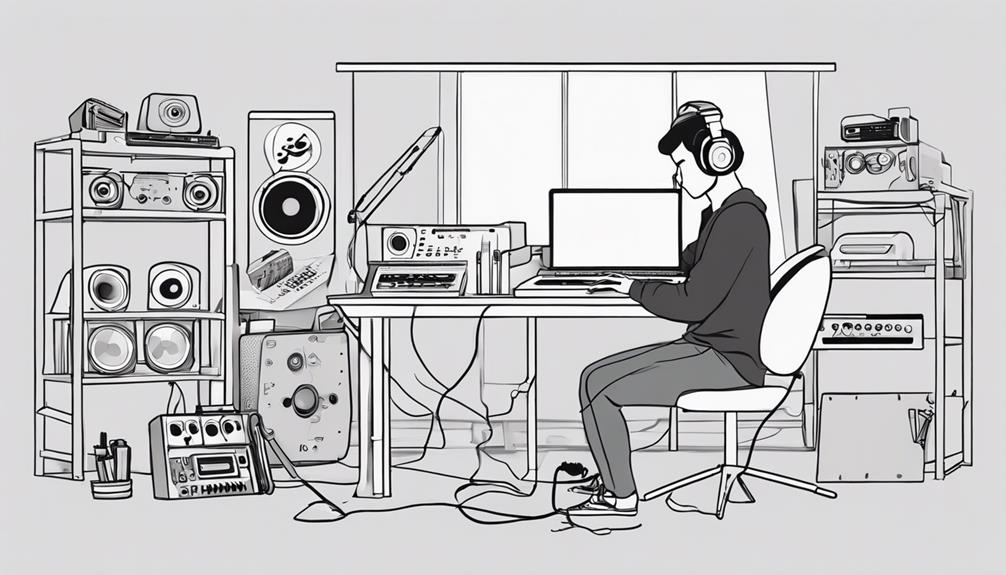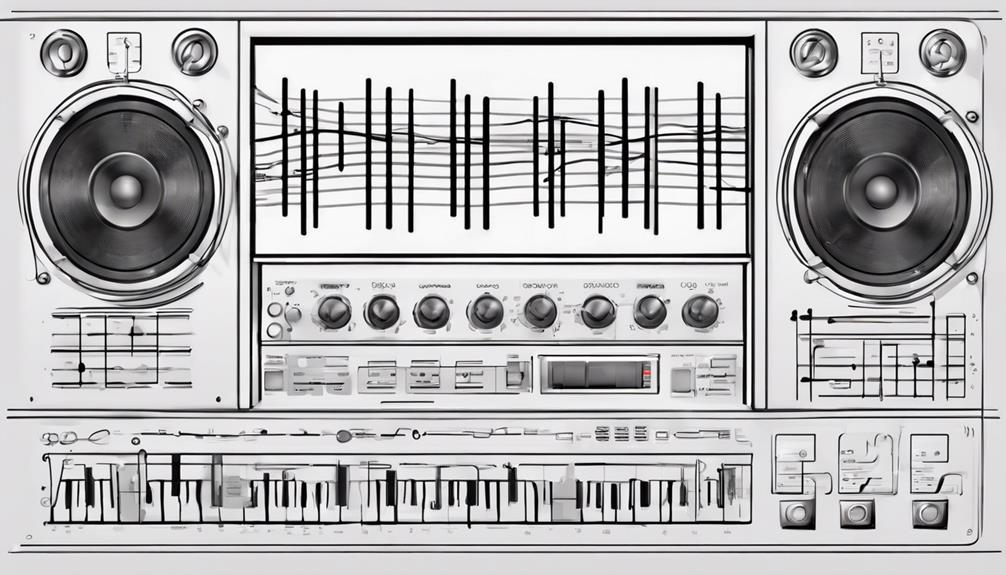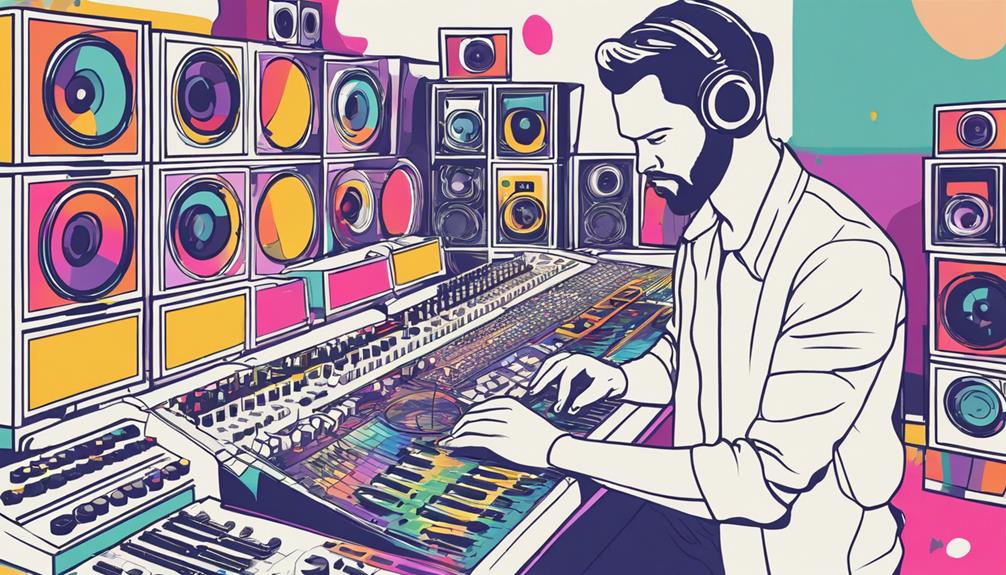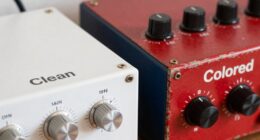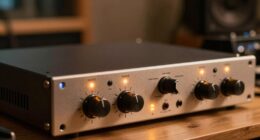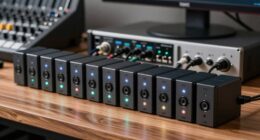To improve your music production skills, focus on mastering music theory, analyzing producer techniques, perfecting your DAW skills, engaging with educational resources, developing skills through practice, staying updated on industry trends, collaborating for creative growth, and exploring different music genres. By honing these areas, you can elevate your productions and become a more versatile and skilled music producer. Each aspect plays a significant role in enhancing your abilities and creativity. You'll find that by paying attention to these elements, your music production skills will grow exponentially, leading you to new heights in your musical journey.
Key Takeaways
- Master music theory basics and key signatures for better understanding.
- Analyze chord progressions and utilize tools like the Circle of Fifths.
- Perfect DAW skills with shortcuts, automation, and advanced editing.
- Engage with educational resources like tutorials and workshops.
- Collaborate with others, explore genres, and stay updated on industry trends.
Mastering Music Theory
To enhance your music production skills, start by mastering music theory fundamentals. Understanding music theory basics, such as scales, chords, and harmony, is essential in improving your skills.
By delving into key signatures and chord progressions, you can elevate the quality of your music productions. This knowledge allows you to create more cohesive and melodically pleasing tracks, providing a strong foundation for experimenting with different musical styles.
Mastering music theory equips you with the tools to analyze and create complex chord progressions that add depth and emotion to your compositions. It enables you to grasp the relationships between notes and keys, enhancing your understanding of music theory.
Utilizing resources like the Circle of Fifths can further assist in addressing the intricacies of music theory, empowering you to make informed decisions in your productions.
Analyzing Producer Techniques
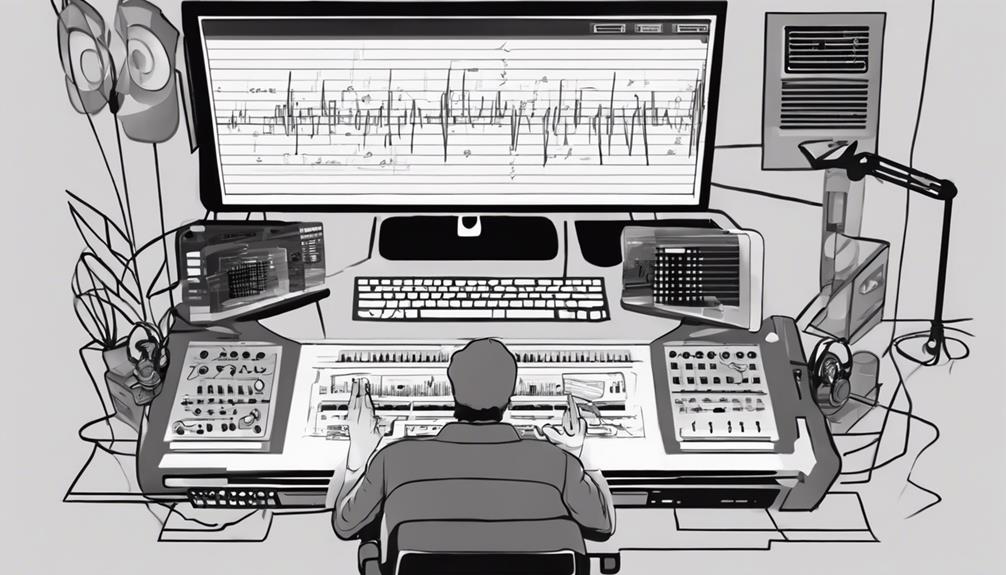
When analyzing producer techniques, you can gain valuable insights into their methods, strategies, and creative choices. Understanding effective production techniques can help you refine your own approach and enhance your skills.
Producer Analysis Methods
Studying producer techniques involves closely examining the arrangement, mixing, and sound design choices of experienced producers. By delving into the intricacies of their work, you can uncover valuable insights into their music production skills and creative approaches.
Analyzing a producer's sound design can reveal the unique elements that define their signature style, while dissecting their arrangement and mixing strategies provides a deeper understanding of their production methods. Deconstructing tracks by experienced producers allows you to unravel their workflow, effects usage, and sound selection, offering a glimpse into their artistic process.
Moreover, comparing multiple tracks from the same producer can shed light on recurring themes, sound design preferences, and mixing techniques they consistently employ. Learning from producer analysis not only enriches your knowledge but also serves as a wellspring of inspiration for enhancing your own productions and expanding your music production skills.
Effective Production Techniques
By examining how professional producers structure their tracks, utilize effects, and manipulate sounds, you can gain valuable insights into effective production techniques. Understanding producer techniques such as layering instruments, creating smooth shifts, and skillful mixing can greatly enhance your music production skills.
By dissecting common trends and unique approaches in successful producer techniques, you can infuse experimentation and creativity into your own music production capabilities. Breaking down these techniques into key components like arrangement, sound design, and mixing allows for a more refined production process.
Additionally, learning from a diverse range of producer techniques spanning various genres can broaden your skill set and elevate your music production prowess. By studying and implementing these effective production techniques, you can elevate the quality of your tracks and develop a signature sound that resonates with your audience.
Skill Enhancement Strategies
How can you effectively enhance your music production skills through analyzing producer techniques?
To improve your music production, immerse yourself in the world of renowned producers. Study their arrangements, mixing choices, and sound design approaches. Break down their tracks to understand workflows, effects usage, and creative decisions. Learn from producer interviews and breakdown videos to grasp insights into their production process.
Focus on specific elements such as drum programming, vocal processing, or synth design in your analysis. By implementing the techniques you learn from producer analysis into your own music productions, you can boost your skills considerably.
Remember to keep practicing, experimenting, and refining your craft. Continuously seek out new production tips and tricks to add to your arsenal. Skill enhancement in music production is a journey that requires dedication, persistence, and a willingness to learn from the best in the industry.
Perfecting Your DAW Skills
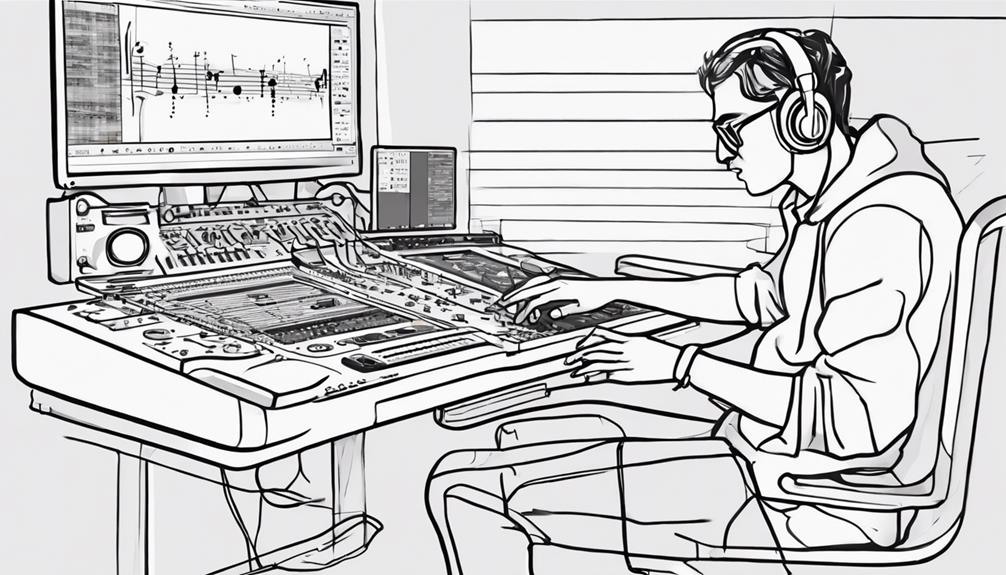
To enhance your music production capabilities, focus on refining your skills in using your DAW efficiently and effectively.
Mastering keyboard shortcuts in your DAW can greatly boost your workflow speed and overall efficiency.
By utilizing automation features, you gain precise control over volume, panning, and effects within your tracks, adding depth and dynamics to your music.
Explore advanced editing techniques such as comping, time-stretching, and pitch correction to achieve seamless and professional productions.
Experimenting with various virtual instruments and MIDI controllers allows you to expand your sound palette and explore new creative possibilities.
Additionally, taking advantage of DAW tutorials and online courses can deepen your understanding and mastery of the software, providing you with valuable insights and techniques to improve your music production skills.
Engaging With Educational Resources
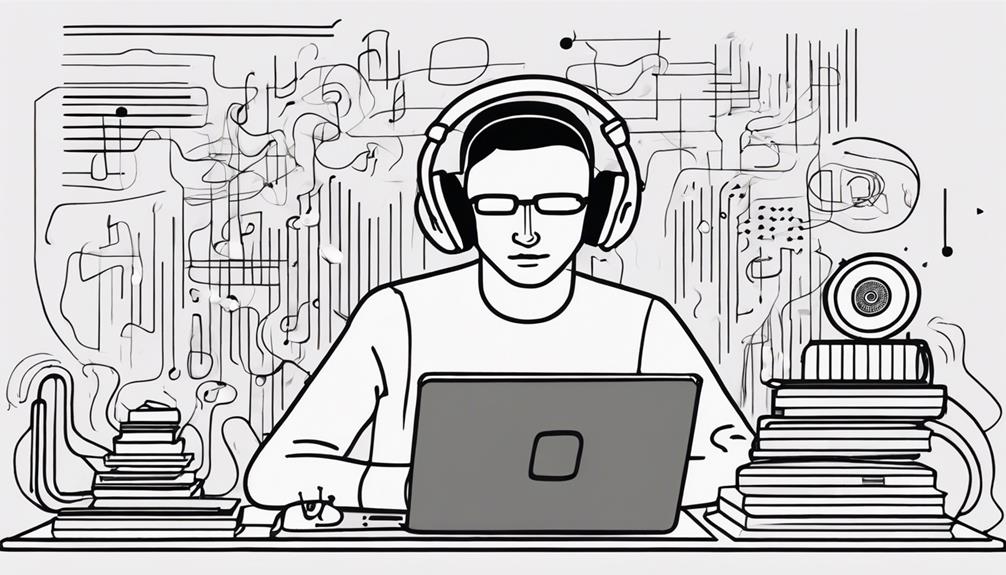
You can enhance your music production skills by exploring online tutorials, workshops, and courses. These resources offer valuable insights and practical approaches to help you improve your technical proficiency.
Engaging with educational materials is a key step towards continuous learning and growth in your music production journey.
Online Tutorials
Engage with online tutorials to enhance your music production skills through step-by-step guidance and valuable insights from industry experts. Online tutorials offer structured learning opportunities on music production techniques and software features.
YouTube channels and music production blogs provide a wealth of tips and tricks from industry professionals, helping you grasp complex concepts with ease. By following reputable online sources, you can stay abreast of the latest trends and tools in the music production industry. These resources not only benefit beginners but also help experienced producers refine their craft and elevate their creative process.
Explore online tutorials and courses to tap into your full potential in music production.
- Immerse yourself in detailed tutorials for a deeper understanding of production techniques.
- Gain insider knowledge from industry experts to enhance your skills.
- Stay ahead of the curve by learning about the latest trends and advancements.
- Explore diverse resources to broaden your creative horizons.
- Connect with a community of learners and professionals to share insights and experiences.
Workshops and Courses
Immerse yourself in hands-on workshops and virtual courses to elevate your music production skills and stay current with industry advancements. Enrolling in virtual music production courses allows you to learn directly from industry professionals, gaining practical insights that can enhance your production abilities.
Attending workshops is another vital way to improve your skills and keep up with the latest trends in the music production world. These workshops provide a hands-on experience with cutting-edge tools and techniques, helping you apply theory to practice effectively.
Watching tutorials from reputable sources is essential for refining your understanding of production techniques and tools. Engage with online educational resources such as YouTube channels and blogs to access valuable tips and updates in music production.
Developing Skills Through Practice
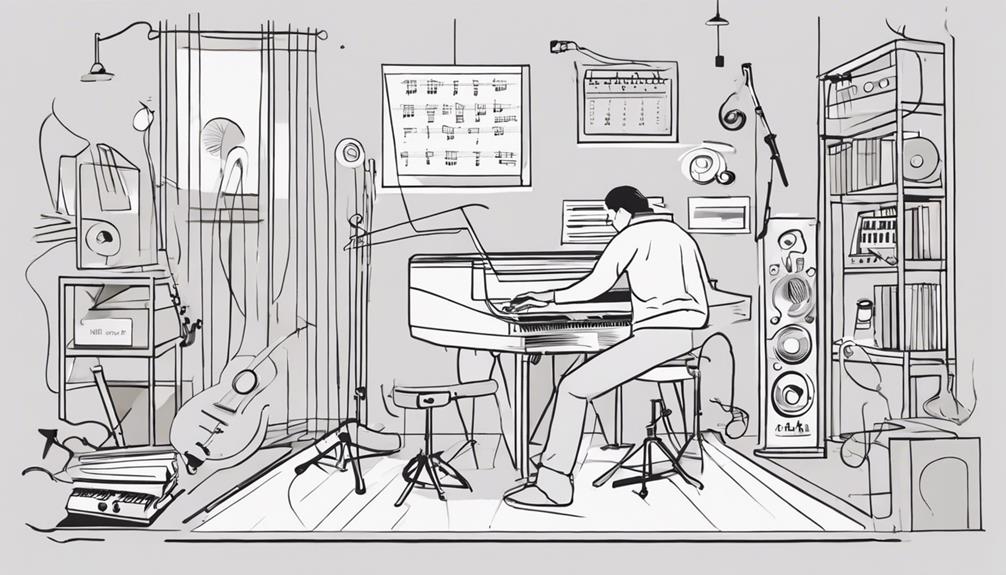
To develop your music production skills effectively, consistent practice is essential for growth and improvement. Regularly dedicating time to practice allows you to refine your skills and become more proficient in your craft.
Here are some key points to keep in mind during your practice sessions:
- Setting specific goals helps track progress and focus on areas needing improvement, boosting motivation.
- Experimenting with different techniques fosters creativity and can lead to unique sounds in your music, enhancing your style.
- Seeking feedback from peers or mentors provides valuable insights for skill refinement and growth.
- Consistency in practice, even through challenges or setbacks, is vital for long-term skill development and progress.
- Embrace the journey of improvement, celebrating small victories along the way to stay motivated and inspired.
Staying Updated on Industry Trends
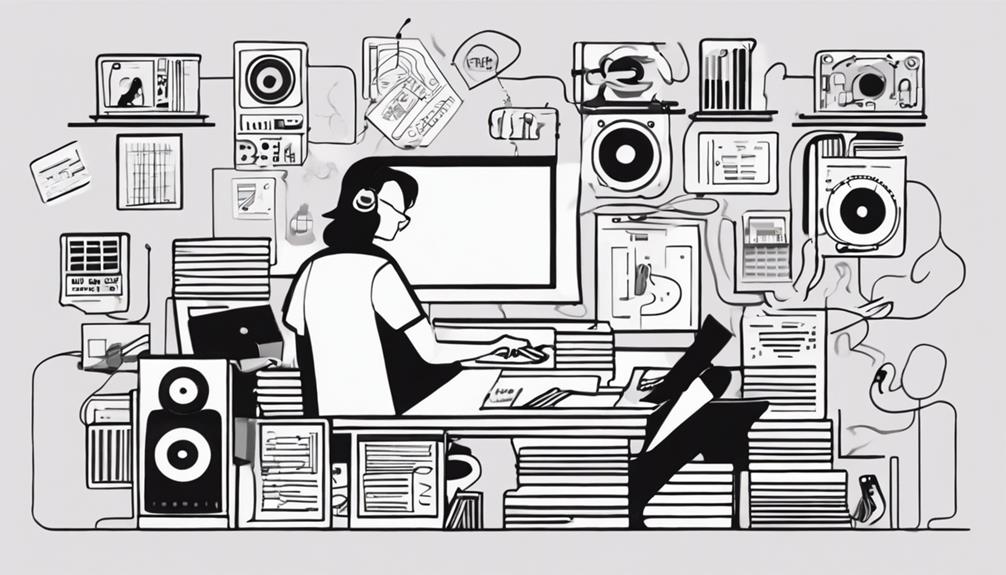
Stay informed and ahead of the curve in the music production industry by actively seeking out the latest trends and techniques. To ensure you are up to date with industry trends, follow industry-leading producers on social media for insights on new techniques and advancements. Attend music production workshops and conferences to stay informed about the latest industry developments. Engage with online forums and communities to discuss emerging trends and exchange ideas with fellow producers. Additionally, subscribing to music production magazines and newsletters can provide you with updates on software advancements and gear releases. It's also beneficial to connect with music production software companies to gain insights into upcoming features and technologies.
| Ways to Stay Updated on Industry Trends | |
|---|---|
| Follow industry-leading producers on social media | Attend music production workshops |
| Join online forums and communities | Subscribe to music production magazines |
Collaborating for Creative Growth
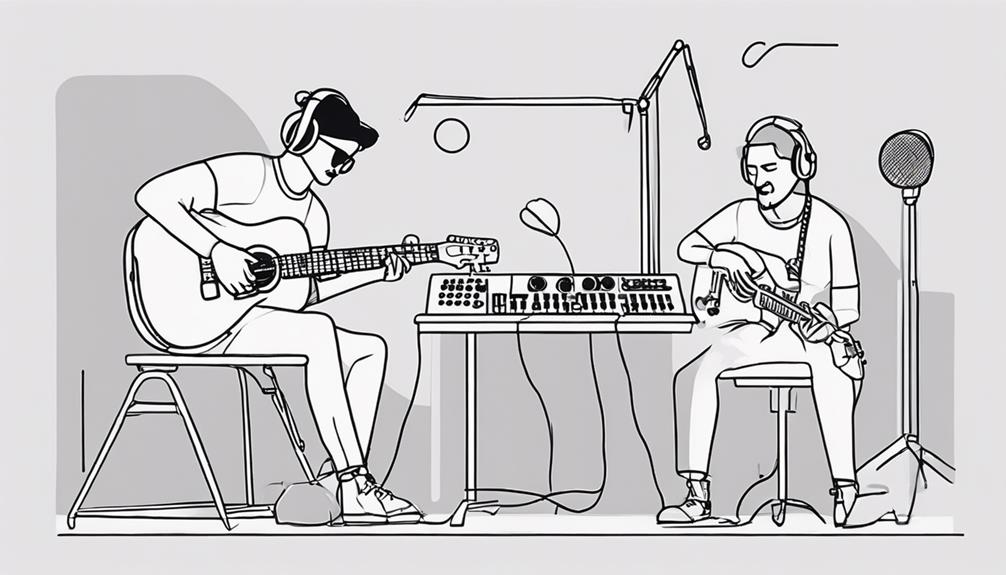
Engaging in collaborative projects with other producers can bring fresh perspectives and ideas for enhancing your creative growth in music production. When collaborating, you not only get the chance to learn from others but also to share your own expertise.
Here are some emotional benefits of collaborating in music production:
- Expand Network: Building connections with other producers can open doors to new opportunities and collaborations.
- Establish Connections: Working with different artists helps you create a supportive community within the music industry.
- Mutual Learning: Sharing knowledge and skills with collaborators fosters a culture of continuous improvement and growth.
- Step Out of Comfort Zone: Collaborative projects push you to explore new techniques and styles, leading to personal and artistic development.
- Inspiration: The energy and creativity that come from working with others can spark new ideas and rekindle your passion for music production.
Exploring Different Music Genres
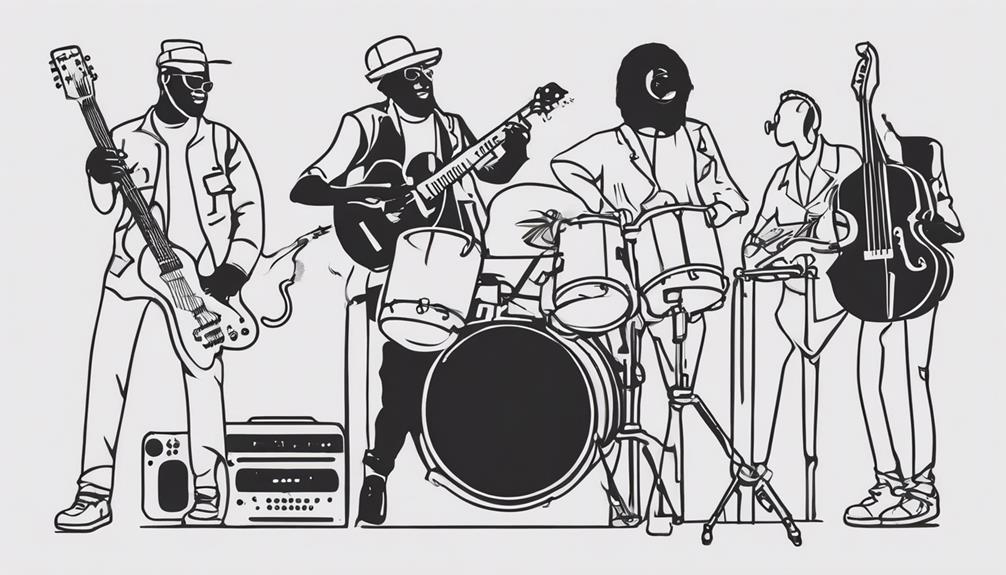
Explore various music genres such as electronic, hip-hop, rock, jazz, and classical to expand your understanding of different styles and techniques. By delving into these diverse genres, you can analyze genre-specific elements like instrumentation, rhythm, harmony, and production techniques, gaining valuable insights into what makes each genre unique.
Experiment with blending genres, such as electronic jazz or rock-infused hip-hop, to create fresh and innovative sounds that push boundaries and captivate listeners.
Study the work of iconic artists like Daft Punk, Kendrick Lamar, The Beatles, Miles Davis, and Beethoven to draw inspiration and see how they've mastered their craft within their respective genres.
Additionally, collaborating with musicians from different genres can open up new possibilities, allowing you to exchange ideas, learn alternative approaches, and create genre-defying music that breaks conventions and sparks creativity in your music production journey.
Frequently Asked Questions
How Can I Get Good at Music Production Fast?
To get good at music production fast, focus on mastering essential skills, use online resources, experiment with genres, seek feedback, and stay dedicated. By doing so, you'll see rapid improvement in your music production abilities. Additionally, collaborate with other producers or musicians to gain fresh perspectives and learn new techniques. Remember that consistent practice is key when figuring out how to get good at music production and developing your unique sound. Embrace mistakes as part of the learning process, as they often lead to breakthrough moments in your creative journey.
How Do You Level up Your Music Production?
To level up your music production, thoroughly engage in music theory basics like chords, scales, and keys. Explore online tutorials for a deeper understanding, master chord variations in your tracks, and apply key signatures for enhanced creativity.
How Do I Improve My Music Knowledge?
To enhance your music knowledge, explore music theory basics, study diverse genres, research production history, take online courses, and attend seminars. These steps will broaden your understanding, skills, and creativity in music production.
How to Become a Good Music Producer?
To become a good music producer, dive deep into music theory, explore diverse genres, experiment with synths, nurture creativity, and perfect speaker setup. Imagine sculpting soundscapes like an artist painting with sound.
Conclusion
You've laid the foundation, now it's time to build your music production skills. Like a sculptor refining a masterpiece, continue to shape and mold your craft. Keep learning, experimenting, and collaborating to create music that resonates with your audience.
The journey to becoming a skilled music producer is like a never-ending symphony, always evolving and growing. Embrace the process and enjoy the beautiful melody you create along the way.

